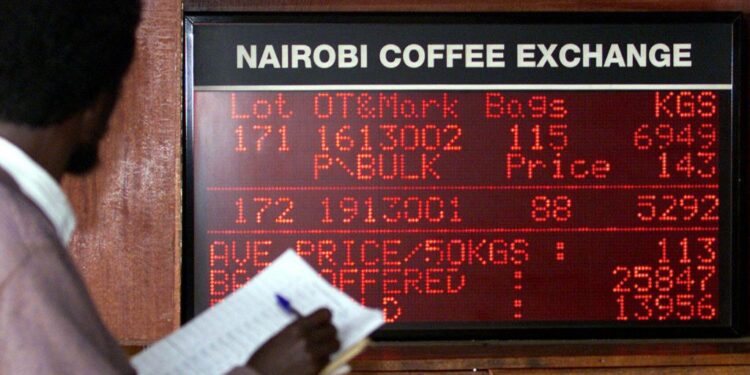Kenya’s coffee industry continues to play a vital role in the country’s economy, with the latest Nairobi Coffee Exchange (NCE) auction generating KSh 1.8 billion for farmers and estates. The weekly auction remains a crucial platform for coffee trading, ensuring farmers receive fair compensation for their produce while reinforcing Kenya’s position as a top coffee exporter.
In the most recent auction, 34,855 bags of 50 kilograms each were traded, marking a 6% decline from the previous week’s 37,204 bags. Despite this drop in volume, the auction still recorded strong earnings, underlining sustained demand for Kenyan coffee in global markets. However, the average price per 50kg bag fell by 7%, from KSh 46,824 to KSh 43,590, translating to KSh 866 per kilogram of clean coffee. Farmers are expected to receive KSh 107 per kilogram of delivered coffee, ensuring continued incentives for quality production.
Premium coffee grades, particularly AA and AB, accounted for 62% of the total volume traded, with 21,487 bags sold. Gachatha Factory in Nyeri County secured the highest price, selling 43 bags of grade AA coffee at KSh 57,690 per 50kg bag, reflecting the continued preference for high-quality Kenyan beans. Among the top brokers facilitating trade, Alliance Berries led with 13,564 bags, followed by Kirinyaga Slopes with 4,068 bags, New KPCU with 3,692 bags, and KCCE-MA with 3,684 bags. Other key participants included Minnesota Marketers, Cebba Trading, Kipkelion, Murang’a Union, and Kiambu Coffee Union, ensuring a broad representation of farmers across different regions.
The auction also attracted significant interest from international and local buyers. Ibero Kenya Ltd emerged as the leading buyer, purchasing 10,682 bags valued at KSh 578 million, followed by C. Dorman Ltd with 6,044 bags worth KSh 356 million. Other notable buyers included Louis Dreyfus Company, Sasini (K) Ltd, and Taylor Winch Ltd, highlighting the strong appetite for Kenyan coffee in global markets. The sustained demand reinforces Kenya’s reputation as a producer of some of the world’s finest coffee, with buyers willing to pay premium prices for high-quality beans.
Nairobi Coffee Exchange CEO Lisper Ndung’u acknowledged the growing production of high-quality coffee, noting that the premium grades have significantly contributed to better earnings for farmers. She emphasized the need for cooperative societies to provide extension services that support improved yields and quality enhancement. Ms. Ndung’u also highlighted the importance of transparency and direct market linkages in strengthening Kenya’s coffee trade, noting that the prevailing strong prices had last been witnessed 15 years ago.
The coffee sector remains a vital pillar of Kenya’s economy, supporting thousands of smallholder farmers while contributing to foreign exchange earnings. The revenue generated through the auction system not only improves the livelihoods of farmers but also strengthens the broader agricultural value chain. With continued investment in quality enhancement, market expansion, and price transparency, the coffee industry is well-positioned for sustained growth, ensuring increased financial benefits for farmers and long-term stability for the sector.










